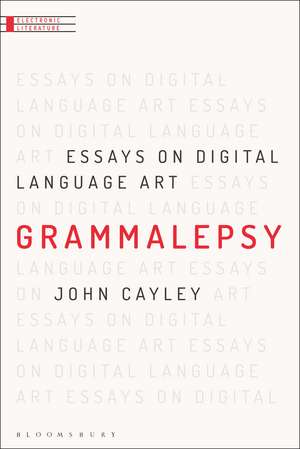Grammalepsy: Essays on Digital Language Art: Electronic Literature
Autor Professor John Cayleyen Limba Engleză Paperback – 18 mar 2020
| Toate formatele și edițiile | Preț | Express |
|---|---|---|
| Paperback (1) | 225.59 lei 6-8 săpt. | +84.86 lei 4-10 zile |
| Bloomsbury Publishing – 18 mar 2020 | 225.59 lei 6-8 săpt. | +84.86 lei 4-10 zile |
| Hardback (1) | 717.79 lei 6-8 săpt. | |
| Bloomsbury Publishing – 19 sep 2018 | 717.79 lei 6-8 săpt. |
Preț: 225.59 lei
Preț vechi: 289.33 lei
-22% Nou
Puncte Express: 338
Preț estimativ în valută:
43.18€ • 46.92$ • 36.29£
43.18€ • 46.92$ • 36.29£
Carte tipărită la comandă
Livrare economică 21 aprilie-05 mai
Livrare express 14-20 martie pentru 94.85 lei
Preluare comenzi: 021 569.72.76
Specificații
ISBN-13: 9781501363184
ISBN-10: 1501363182
Pagini: 312
Dimensiuni: 152 x 229 x 20 mm
Greutate: 0.41 kg
Editura: Bloomsbury Publishing
Colecția Bloomsbury Academic
Seria Electronic Literature
Locul publicării:New York, United States
ISBN-10: 1501363182
Pagini: 312
Dimensiuni: 152 x 229 x 20 mm
Greutate: 0.41 kg
Editura: Bloomsbury Publishing
Colecția Bloomsbury Academic
Seria Electronic Literature
Locul publicării:New York, United States
Caracteristici
Introduces a new theory of aesthetic language practice that can be applied to digital language art and electronic literature
Notă biografică
John Cayley is Professor of Literary Arts at Brown University, USA. He has practiced as a poet, translator, publisher, and bookdealer, practices which have often intersected with his training in Chinese culture and language. In addition to his internationally recognized writing on networked and programmable media, he has written two printed books of poetic work, Ink Bamboo (1996) and Image Generation (2015).
Cuprins
List of FiguresPrefaceAcknowledgementsIntroduction: Grammalepsy01. Beyond Codexspace: Potentialities of Literary Cybertext02. Pressing the "Reveal Code" Key03. Of Programmatology04. The Code Is Not the Text (Unless It Is the Text)05. Hypertext/Cybertext/Poetext06. Writing on Complex Surfaces07. Time Code Language08. The Gravity of the Leaf09. Writing to Be Found and Writing Readers10. Weapons of the Deconstructive Masses11. Terms of Reference & Vecotralist Transgressions12. Reading and Giving / Voice and Language13. Reconfiguration14. An Instance of Aurature at the End(s) of Electronic LiteratureBibliographyNotes
Recenzii
An essential book for many reasons. The quality of the author's theoretical sharpness and reflection is of course one of them, and one will find in this book an in-depth but often somewhat polemic dialogue with all the major critics and theoreticians in the field ... One can only be admiring of the pioneering and visionary dimension of these essays, often much ahead of their times.
John Cayley has been a respected figure in digital language art since his first works appeared in the 1970s. For decades, his distinctive creative approach has combined with careful, critical, erudition to continually chart new directions in the field of emerging literary practices. This collection of essays, many of which are now canonical references, tracks twenty years of Cayley's thinking about poetics, code, and composition. As for this radical new concept-grammalepsy- as a way to understand how language is "grasped and read"-it will no doubt have a long-term ripple effect through the multiple domains of linguistic discourse.
John Cayley has already had a deep and lasting influence on the fields of new media studies, electronic literature, conceptual writing, and poetics - and this long-awaited volume elegantly frames his most important critical essays as well as his artistic practice. No one has done more to theorize, and translate, the philosophical and aesthetic complexity of digital language art, and this volume will endure as the definitive compilation of Cayley's work.
John Cayley has been a respected figure in digital language art since his first works appeared in the 1970s. For decades, his distinctive creative approach has combined with careful, critical, erudition to continually chart new directions in the field of emerging literary practices. This collection of essays, many of which are now canonical references, tracks twenty years of Cayley's thinking about poetics, code, and composition. As for this radical new concept-grammalepsy- as a way to understand how language is "grasped and read"-it will no doubt have a long-term ripple effect through the multiple domains of linguistic discourse.
John Cayley has already had a deep and lasting influence on the fields of new media studies, electronic literature, conceptual writing, and poetics - and this long-awaited volume elegantly frames his most important critical essays as well as his artistic practice. No one has done more to theorize, and translate, the philosophical and aesthetic complexity of digital language art, and this volume will endure as the definitive compilation of Cayley's work.




